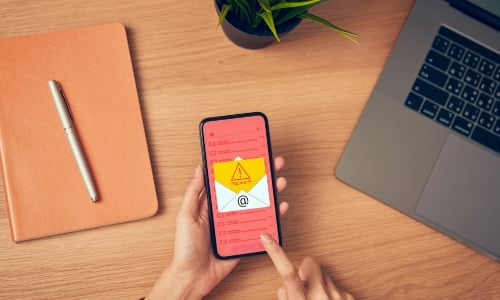Beware of scams and profile hacks in the new year
Most scams are used by fraudsters year to year. You might think you’re familiar; however, it’s important to refresh yourself on the most common types so you can recognize fraud attempts before it’s too late. Here are a few of the most common to look out for as we enter the new year.

Emails
- Is it from a suspicious sender that you don't know?
- Does it include a link to a strange web address?
- Is the sender asking you for money or to confirm your account or credit card number?
- Does it sound too good to be true?
Somewhere in the world, someone is hiding behind a computer screen, trying to lure complete strangers into their scams. It could be someone in another country, or it could be the guy you always see at the grocery store. The point is, these people use the crutch of anonymity to try to make money through scams via email and other avenues.
If you ever receive a message from a wealthy socialite in need of help or someone telling you that you won the lottery, don't fall for it. If you're really not sure, check online to see if anyone else is having this problem.
Phone calls
- Is it an automated voice?
- Is it an unknown or blocked number?
- Is it asking you to enter or confirm a credit card number?
- Does it sound too good to be true?
Sensing a pattern yet? Trust your instincts here. Only give out your personal information to those you truly trust. If the caller already has your personal information and asks you to confirm it, they might be doing this so that they can later say that you authorized a purchase or gave them permission to charge you for something that you never intended to buy.
Be wary of calls from blocked numbers-the caller may be trying to conceal their identity because they are trying to scam you. If it's a “robocall,” or a call with a prerecorded message, and you suspect it's a scam, hang up. Whenever you think you are being targeted for a scam, call the Federal Trade Commission and report it.
Social media
- Did you receive a message with a link from someone you don't know very well?
- Are there misspelled words or strange punctuation?
- Are they trying to sell you a product or informing you about a great deal?
- Does it sound too good to be true?
Be careful if you get a message from someone that you don't talk to regularly, especially if they're trying to get you to click on a weird link. This is, most likely, someone who has hacked into your friend's social media profile. Clicking on the link could infect your computer with a virus, or it could allow the person behind this to do the same thing to you as well.
The best approach is to try to contact your friend over a different platform to inform them that they've been hacked, and then delete them as a friend on the social media channel.
Bottom line: if the offer sounds so good that it couldn't possibly be real, it probably isn't. Make sure you're making smart decisions with your personal information.
